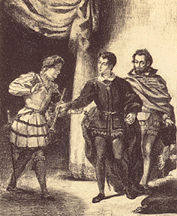Names
Rosencrantz ("rose wreath") and Gyldenstjerne/Gyllenstierna ("golden star") were names of Scandinavian noble families of the 16th century; records of the Danish royal coronation of 1596 show that one tenth of the aristocrats participating bore one or the other name. [1]
James Voelkel suggests that the characters were named after Frederik Rosenkrantz and Knud Gyldenstierne, cousins of Tycho Brahe who had visited England in 1592. [2] When James VI and I visited Norway and Denmark in 1589, he met Tycho Brahe and Henrik Gyldenstierne, captain of Bohus. [3] In a gift exchange, Gyldenstierne gave James VI a firearm and a sword, and James VI gave him a ring and a gold chain. When James VI was at Elsinore (Kronborg), a servant of Axel Gyldenstierne, captain of Akershus, was rewarded for bringing letters to the Scottish king. [4]
The majority of characters in Hamlet have classical names, in contrast to the "particularly Danish" ones of Rosencrantz and Guildenstern. The names were common in the court of Frederick II and Christian IV, and also at the University of Wittenberg, an institution where Hamlet is mentioned as having studied (he refers to them as "my two schoolfellows"). [5]
Appearances
In Hamlet, Rosencrantz and Guildenstern always appear as a pair, except in editions following the First Folio text, where Guildenstern enters four lines after Rosencrantz in Act IV, Scene 3. [1]
The two courtiers first appear in Act II, Scene 2, where they attempt to place themselves in the confidence of Prince Hamlet, their childhood friend. The smooth and courtly language they employ immediately establishes them as sycophants [1] really serving as spies for the corrupt King Claudius, Hamlet's uncle, who usurped the throne and constantly attempts to check his nephew. Hamlet welcomes them as "excellent good friends", but, seeing through their guise, comments that they won't "deal justly" with him about their mission. [1] Realising that he lacks allies except for Horatio, Hamlet gives the speech "What a piece of work is a man" to Rosencrantz and Guildenstern. [1]
In Act III, Hamlet seems to drop the pretense of friendship, coldly dismissing the two in Scene 2. Line 319 is perhaps his only use of the royal "we" in the play, although he may also be addressing the other person present on the stage, Horatio, with whom Hamlet first saw the ghost they are discussing. To his mother, he comments in Scene 4 that "I will trust [them] as I will adders fang'd."
When Hamlet kills Polonius, Claudius recruits Rosencrantz and Guildenstern to escort Hamlet to England, providing them with a letter for the King of England instructing him to have Hamlet killed. (They are apparently unaware of what is in the letter, though Shakespeare never explicitly says so.) Along the journey, the distrustful Hamlet finds and rewrites the letter, instructing the executioner to kill Rosencrantz and Guildenstern instead. When their ship is attacked by pirates, Hamlet returns to Denmark, leaving Rosencrantz and Guildenstern to die; he comments in Act V, Scene 2 that "They are not near my conscience; their defeat / Does by their own insinuation grow." Ambassadors returning later report that "Rosencrantz and Guildenstern are dead."
